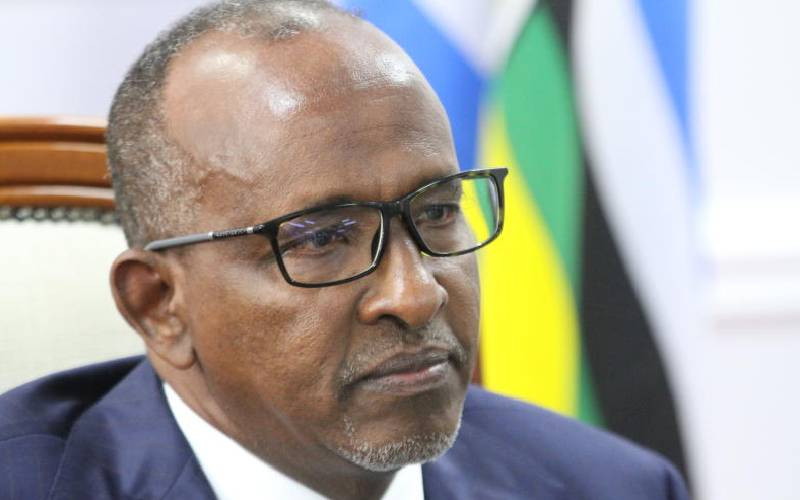
Pharmacists and key health stakeholders are calling on the government to strengthen the country’s drug supply chain by integrating pharmacists more prominently in decision-making and operations, particularly within the Kenya Medical Supplies Authority (KEMSA).
This call was made during the inauguration of the new leadership of the Pharmaceutical Society of Kenya (PSK) in Nairobi, where leaders and partners gathered to chart a new course for the profession.
Dr Wairimu Mbogo, the incoming PSK President, declared that pharmacists must be central to the management of health products and technologies (HPTs). “The threats are real. The patient's and public safety is not negotiable. Investors are entering our space without valuing the pharmacist,” she said.
“We shall protect our supply chains. KEMSA currently has less than 2 per cent of its workforce as pharmacists. Meanwhile, similar global institutions have up to 70 per cent.”
She added that Kenyan pharmacists, who are often contracted by other nations to help build efficient health supply chains, should also be empowered to do so locally. “We are ready to support our government to realise similar levels of efficiency, right up to the county level,” she said.
Recent concerns about medicine wastage due to expiry, rising online drug sales and infiltration by unqualified individuals have triggered urgency in the industry. Outgoing PSK President Dr Louis Machogu echoed these fears, noting that having pharmacists in leadership positions is critical to curbing such losses.
“When a pharmacist makes the decisions, wastage reduces. You get the right medicines, in the right quantities, at the right time,” he said. “Let’s not have people without pharmaceutical training running sensitive operations. Let’s put the right people in the right places.”
- Health unions urge dialogue on police violence as protests strain hospitals
- SHA: Patients' one-year pain, scandals and unpaid claims
- Court lifts ban on Marie Stopes safe abortion adverts, quashes KMPDC directive
Keep Reading
Dr Mbogo also highlighted the growing danger of unregulated online pharmacies and individuals operating without proper licenses. “Quacks are bypassing safeguards. We will not allow it,” she said, adding that PSK would prioritise patient protection and push for systems that enable the public to identify legitimate healthcare providers.
Laura Nabwire, Country Director at inSupply Health, applauded the Society’s efforts in building leadership capacity. “Pharmacists in Kenya cut across different industries. It’s encouraging to see how PSK is preparing for the future. Collaboration and partnerships will drive the next steps,” she said.
The PSK transition comes at a time when Kenya’s pharmaceutical sector is undergoing significant legislative changes. Dr Machogu pointed to several ongoing efforts, including the proposed Kenya Drug Authority (KDA) Bill and the Good Pharmacy Practice Guidelines, aimed at raising professional standards and protecting patients.
“These frameworks will not only guide our practice but will enhance the confidence of the public in pharmacists as trusted healthcare providers,” said Dr Machogu during his farewell address. He emphasised the pharmacist’s role in policy, research, and manufacturing, far beyond dispensing medicine.
Dr Sammy Masibo, the incoming treasurer, emphasised the need for stronger regulation of medicine sales, especially online. “Everyone is just opening a pharmacy anywhere. That’s a real issue, and the sale of counterfeit drugs online is rising. The public doesn’t know who to trust,” he said. “PSK will work with the Pharmacy and Poisons Board (PPB) to strengthen oversight and provide clarity to the public on where it is safe to buy medicine.”
Beyond regulation, Dr Mbogo’s vision also focuses on unity within the profession and tapping into both the wisdom of seasoned pharmacists and the energy of the younger generation. “Unity is not a slogan. It’s survival. It’s the only way we win,” she said. “Our golden oldies carry wisdom; our youth bring innovation. They must build together.”
Her leadership manifesto revolves around four pillars: education, policy, innovation and collaboration, summed up in the acronym EPIC. Among her proposals are practical, continuous professional development, broader pharmacist involvement in legislative advocacy and embracing digital health innovations.
Dr Mbogo urged members to rally behind the new leadership and participate actively in transforming the profession. “This is not just a profession. It’s a calling. Let us honour that calling,” she said.
The PSK hopes its renewed push for reforms will elevate the profession, embed pharmacists firmly in health systems, and ensure Kenyans access safe, effective, and professionally managed pharmaceutical care, key steps toward achieving a WHO-compliant pharmaceutical system and universal health coverage in Kenya.
 The Standard Group Plc is a multi-media organization with investments in media
platforms spanning newspaper print
operations, television, radio broadcasting, digital and online services. The
Standard Group is recognized as a
leading multi-media house in Kenya with a key influence in matters of national
and international interest.
The Standard Group Plc is a multi-media organization with investments in media
platforms spanning newspaper print
operations, television, radio broadcasting, digital and online services. The
Standard Group is recognized as a
leading multi-media house in Kenya with a key influence in matters of national
and international interest.











